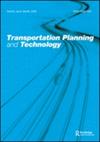电动助力车使用与居民主观幸福感的关系——基于贝叶斯网络的上海实证研究
IF 1.8
4区 工程技术
Q3 TRANSPORTATION SCIENCE & TECHNOLOGY
引用次数: 0
摘要
主观幸福感(Subjective well-being, SWB)对个体的幸福和健康以及社会的可持续发展有着显著的影响。影响居民生活幸福感的一个关键因素是他们对交通方式的选择。然而,作为中国最流行的交通方式之一,电动助力车的使用对居民幸福感的影响研究有限。为了解决这一差距,本研究利用上海8个交通分析区的调查数据,对各种用途的电动助力车使用与居民主观幸福感之间的关系进行了实证调查。建立贝叶斯网络模型,探讨旅游相关属性、社会人口特征与主观幸福感之间的关系。该模型的结果显示,电动助动车的使用与实现更高SWB的可能性之间存在很强的相关性。因此,支持上海电动助力车的发展至关重要,并提出了针对性的政策建议。本文章由计算机程序翻译,如有差异,请以英文原文为准。
The association between e-moped usage and residents’ subjective well-being: a case study of Shanghai, China by using Bayesian network
ABSTRACT Subjective well-being (SWB) is known to significantly influence individuals’ happiness and health, as well as sustainable social development. One crucial factor that affects residents’ SWB is their choice of transport mode. However, limited research has been conducted on how the use of e-mopeds, one of the most prevalent transportation modes in China, impacts residents’ SWB. To address this gap, this study utilizes survey data from eight traffic analysis zones in Shanghai to conduct an empirical investigation focused on the relationship between the use of e-mopeds for various purposes and residents’ SWB. A Bayesian network (BN) model is established to explore the correlations among travel-related attributes, socio-demographics, and SWB. The model's results reveal a strong correlation between e-moped usage and the likelihood of achieving higher SWB. Consequently, supporting the development of e-mopeds in Shanghai is considered crucial, and targeted policies are suggested.
求助全文
通过发布文献求助,成功后即可免费获取论文全文。
去求助
来源期刊

Transportation Planning and Technology
工程技术-运输科技
CiteScore
3.40
自引率
6.20%
发文量
24
审稿时长
12 months
期刊介绍:
Transportation Planning and Technology places considerable emphasis on the interface between transportation planning and technology, economics, land use planning and policy.
The Editor welcomes submissions covering, but not limited to, topics such as:
• transport demand
• land use forecasting
• economic evaluation and its relationship to policy in both developed and developing countries
• conventional and possibly unconventional future systems technology
• urban and interurban transport terminals and interchanges
• environmental aspects associated with transport (particularly those relating to climate change resilience and adaptation).
The journal also welcomes technical papers of a more narrow focus as well as in-depth state-of-the-art papers. State-of-the-art papers should address transport topics that have a strong empirical base and contain explanatory research results that fit well with the core aims and scope of the journal.
 求助内容:
求助内容: 应助结果提醒方式:
应助结果提醒方式:


